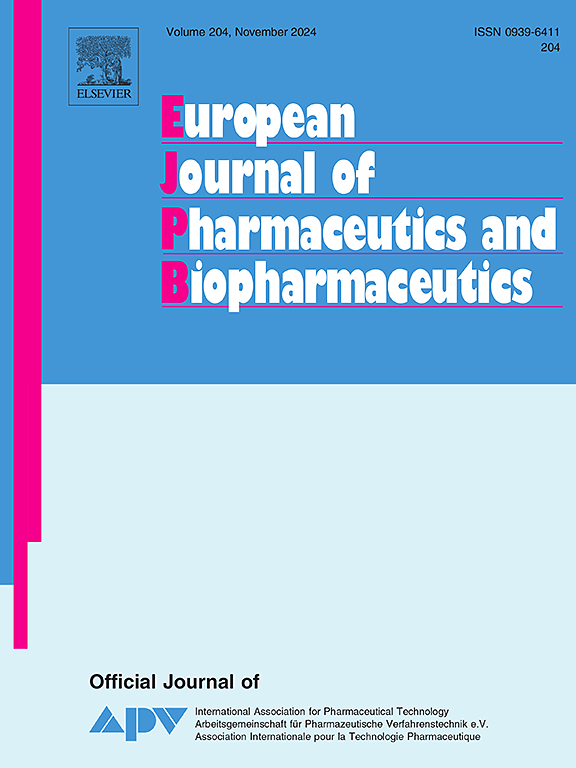Long-term exposure in high viscous microenvironment facilitates acquired drug resistance of colon cancer cells to doxorubicin
IF 4.3
2区 医学
Q1 PHARMACOLOGY & PHARMACY
European Journal of Pharmaceutics and Biopharmaceutics
Pub Date : 2025-09-02
DOI:10.1016/j.ejpb.2025.114852
引用次数: 0
Abstract
Chemotherapy is one of the most common strategies for treating colorectal cancer (CRC). However, acquired drug resistance (ADR) impairs the efficiency of chemotherapy. For CRC treatment, the long-term administration could affect cancer microenvironment and induce environment-mediated drug tolerance that contributes to ADR. Nevertheless, it is elusive that how the alteration of microenvironment affects the ADR of colon cancer cells. In this study, the effect of microenvironmental viscosity on ADR of colon cancer cells to doxorubicin (DOX) was investigated by long-term culture of colon cancer cells in different viscous media supplemented with DOX. The 50% inhibitory concentration (IC50) value of drug-resistant cells established by culturing in high viscosity media was significantly higher than that of cells cultured in low viscosity media. The drug-resistant colon cancer cells established in high viscosity media exhibited higher expression levels of drug resistance-related genes (ABCC2 and ABCG2), higher migration ability and lower proliferation ability than the cells established in low viscosity medium. Long-term exposure in DOX-containing high viscosity media made the cells more tolerant to DOX and facilitated the ADR of colon cancer cells to DOX. The results disclosed the importance of microenvironmental viscosity on the ADR development and should provide useful information for cancer therapy.

长期暴露于高粘性微环境有利于结肠癌细胞对阿霉素的获得性耐药
化疗是治疗结直肠癌(CRC)最常用的策略之一。然而,获得性耐药(ADR)损害了化疗的效率。对于结直肠癌的治疗,长期给药会影响肿瘤微环境,诱发环境介导的药物耐受,从而导致不良反应的发生。然而,微环境的改变如何影响结肠癌细胞的不良反应尚不清楚。本研究通过在不同黏度培养基中添加DOX对结肠癌细胞进行长期培养,研究微环境黏度对结肠癌细胞对阿霉素(DOX)不良反应的影响。高黏度培养基培养的耐药细胞50%抑制浓度(IC50)值明显高于低黏度培养基培养的耐药细胞。在高黏度培养基中培养的耐药结肠癌细胞比在低黏度培养基中培养的耐药相关基因(ABCC2和ABCG2)表达水平更高,迁移能力更强,增殖能力更低。长期暴露于含DOX的高粘度培养基中,细胞对DOX的耐受性增强,促进了结肠癌细胞对DOX的不良反应。结果揭示了微环境粘度对不良反应发展的重要性,为癌症治疗提供了有用的信息。
本文章由计算机程序翻译,如有差异,请以英文原文为准。
求助全文
约1分钟内获得全文
求助全文
来源期刊
CiteScore
8.80
自引率
4.10%
发文量
211
审稿时长
36 days
期刊介绍:
The European Journal of Pharmaceutics and Biopharmaceutics provides a medium for the publication of novel, innovative and hypothesis-driven research from the areas of Pharmaceutics and Biopharmaceutics.
Topics covered include for example:
Design and development of drug delivery systems for pharmaceuticals and biopharmaceuticals (small molecules, proteins, nucleic acids)
Aspects of manufacturing process design
Biomedical aspects of drug product design
Strategies and formulations for controlled drug transport across biological barriers
Physicochemical aspects of drug product development
Novel excipients for drug product design
Drug delivery and controlled release systems for systemic and local applications
Nanomaterials for therapeutic and diagnostic purposes
Advanced therapy medicinal products
Medical devices supporting a distinct pharmacological effect.

 求助内容:
求助内容: 应助结果提醒方式:
应助结果提醒方式:


